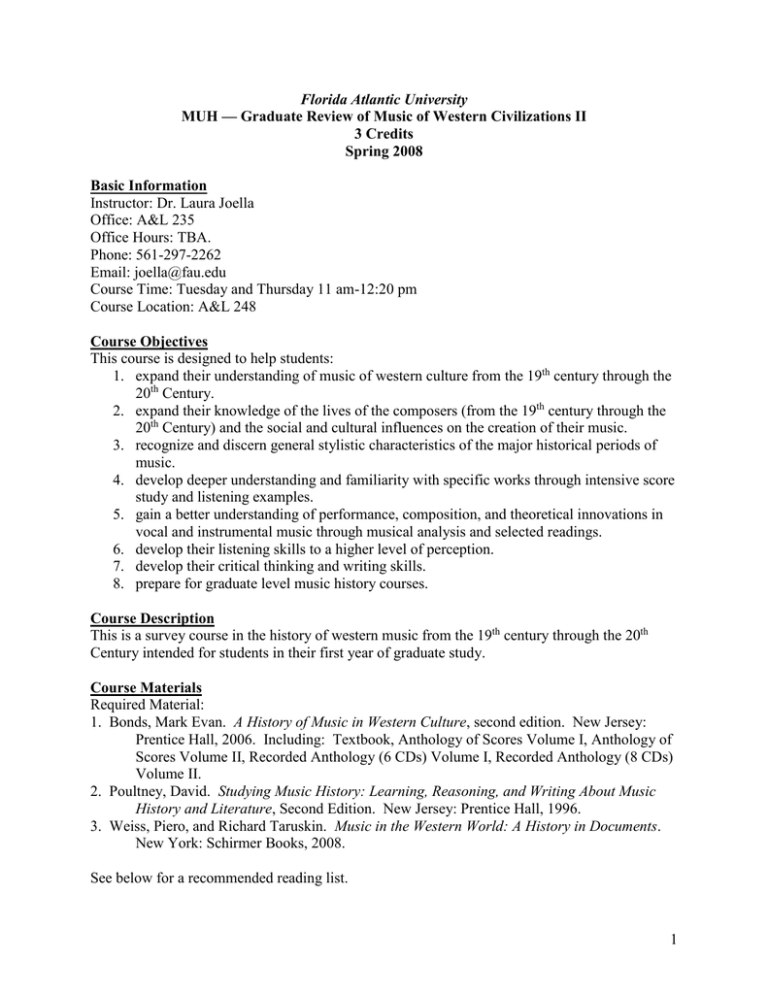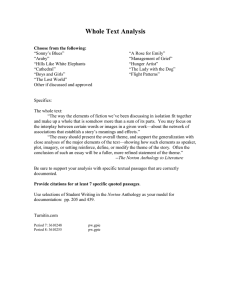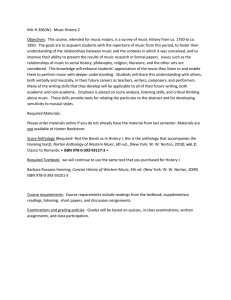Instructor: Dr. Laura Joella Office: A&L 235 Office Hours: TBA.
advertisement

Florida Atlantic University MUH — Graduate Review of Music of Western Civilizations II 3 Credits Spring 2008 Basic Information Instructor: Dr. Laura Joella Office: A&L 235 Office Hours: TBA. Phone: 561-297-2262 Email: joella@fau.edu Course Time: Tuesday and Thursday 11 am-12:20 pm Course Location: A&L 248 Course Objectives This course is designed to help students: 1. expand their understanding of music of western culture from the 19th century through the 20th Century. 2. expand their knowledge of the lives of the composers (from the 19th century through the 20th Century) and the social and cultural influences on the creation of their music. 3. recognize and discern general stylistic characteristics of the major historical periods of music. 4. develop deeper understanding and familiarity with specific works through intensive score study and listening examples. 5. gain a better understanding of performance, composition, and theoretical innovations in vocal and instrumental music through musical analysis and selected readings. 6. develop their listening skills to a higher level of perception. 7. develop their critical thinking and writing skills. 8. prepare for graduate level music history courses. Course Description This is a survey course in the history of western music from the 19th century through the 20th Century intended for students in their first year of graduate study. Course Materials Required Material: 1. Bonds, Mark Evan. A History of Music in Western Culture, second edition. New Jersey: Prentice Hall, 2006. Including: Textbook, Anthology of Scores Volume I, Anthology of Scores Volume II, Recorded Anthology (6 CDs) Volume I, Recorded Anthology (8 CDs) Volume II. 2. Poultney, David. Studying Music History: Learning, Reasoning, and Writing About Music History and Literature, Second Edition. New Jersey: Prentice Hall, 1996. 3. Weiss, Piero, and Richard Taruskin. Music in the Western World: A History in Documents. New York: Schirmer Books, 2008. See below for a recommended reading list. 1 Prerequisites Prerequisites include MUH 4211 Music of Western Civilizations I, and MUT 2117 Music Theory IV with a grade of C or higher. Course Requirements There will be reading assignments, score study, and listening assignments for almost every class. There will be one research paper, a mid-term and a final exam. It is essential that all assignments be completed on time. Late papers will not be accepted unless approved by the professor before the deadline. See below for additional details. Course Procedure Class sessions will be devoted to lecture, guided discussion, musical analysis, and development of active listening skills through musical and video examples. Conduct Students must be respectful, attentive and patient in the classroom environment at all times. In accordance with the FAU Rules and Regulations, students are to refrain from all academic irregularities and disruptive conduct. (Disruptive conduct includes but is not limited to: talking during lectures, distracting other students from classroom activities, phone calls, text messaging, phone camera usage, and any other behavior that negatively affects the learning environment.) Failure to refrain from academic irregularities and disruptive conduct will result in appropriate disciplinary action. Please turn off and put away all cell phones prior to the start of class. Attendance Attendance will be taken at every class meeting. Two unexcused absences are allowable but not encouraged. If you anticipate the need to miss more than two classes, it is advised that you notify the professor as soon as possible, since any absences beyond the allowable limit will affect your overall grade. Each additional absence will both lower your overall grade by 3% points and affect the attendance and participation portion of your grade. An excused absence will only be accepted with proper documentation. The instructor has final say over which excuses and documentation constitutes an acceptable excused absence. Students involved in any University-approved activity will be excused with proper documentation from your supervising official. All documentation must be turned in no later than the day of the final. NO EXCEPTIONS. Departure from class before dismissal will result in a tardy or absence for that class session as determined by the instructor. Tardies You are tardy if you arrive after class has begun. If you are tardy, it is your responsibility to speak to the instructor after class to receive any credit for attendance. FOUR tardies equal one unexcused absence. There is no leniency with this rule. Grading Two exams (one in class and the final) Attendance, participation Research papers 50% 10% 40% 2 Final grades will be assigned as follows: 93% - 100% A 80% - 82% 90% - 92% A77% - 79% 87% - 89% B+ 73% - 76% 83% - 86% B 70% - 72% BC+ C C- 67% - 69% 63% - 66% 60% - 62% 0% - 59% D+ D DF Academic Honesty The providing and/or receiving of any unauthorized assistance related to course requirements is absolutely prohibited. You are allowed and encouraged to study with other students outside of class, but any unauthorized assistance received or provided during the course of any graded material will not be tolerated (this does not refer to peer review of research papers). In addition, plagiarizing another’s work (i.e., using someone else’s work without proper reference in a writing assignment) is prohibited. Any violation of this policy will receive a failing grade for that assignment and possibly for the course as well. Please refer to the Department of Music’s Student Handbook for complete information on academic irregularities. Research Papers There will be two research papers due this semester. Each paper should be about 4000 words (16 typed pages). Include at least 9 sources, only two may be internet sites and two must include RILM and Grove Music Online. The paper should have one inch margins and use 12 point Times New Roman double spaced font. All papers must have a title page and a bibliography. Refer to the bibliography and footnote document on BlackBoard. Papers that do not meet the criteria will not receive full credit. A hard copy of your paper is due at the beginning of class on the days stated below. Late papers will not be accepted. In addition to the hard copy, students must submit a copy through Blackboard for evaluation by TurnItIn before the beginning of class on the days stated below. The papers submitted through Blackboard DO NOT take the place of hard copies submitted in class. You must submit both in order to get a grade. See below for due dates. The University Center for Excellence in Writing offers a range of free support services at any point in the writing process (i.e. brainstorming, drafting, revising) to help students become more reflective writers and readers as well as more self-sufficient crafters of their written work. Please take advantage of this resource and go to http://www.fau.edu/UCEW/us.htm for additional information. Examinations There will be two non-comprehensive examinations which may include listening and score identification, matching, fill in the blank, short answer, short essay, essay, and true or false questions. MISSED TESTS WILL NOT BE MADE UP WITHOUT A WRITTEN DOCTOR’S EXCUSE OR POLICE REPORT DETAILING YOUR EMERGENCY. Any missed exam must be made up before the following class meeting. Library Reserve The anthology of scores and recordings are on reserve in the FAU library under these numbers: RES 940 Anthology of Scores volume 1; RES 941 CD set volume 1; RES 942 Anthology of Scores volume 2; RES 943 CD set volume 2. 3 Recommended Reading Bibliography Juliane Brand and Christopher Hailey, ed. Constructive Dissonance: Arnold Schoenberg and the Transformations of Twentieth Century Culture. Berkeley: University of California Press, 1997. Burkholder, J. Peter, Donald J. Grout, and Claude V. Palisca. A History of Western Music, Seventh Edition. New York: W. W. Norton & Company, 2006. Burkholder, J. Peter and Jennifer L. King. Study and Listening Guide for A History of Western Music, Seventh Edition (Burkholder, Grout, Palisca) and Norton Anthology of Western Music, Fifth Edition (Burkholder, Palisca). New York: W. W. Norton & Company, 2006. Scott Burnham and Michael P. Steinberg, ed. Beethoven and His World. New Jersey: Princeton University Press, 2000. Crittenden, Camille. Johann Strauss and Vienna: Operetta and the Politics of Popular Culture. New York: Cambridge University Press, 2000. Downs, Philip G. Classical Music: The Era of Haydn, Mozart, and Beethoven. New York: W. W. Norton & Company, 1992. Christopher H. Gibbs, ed. The Cambridge Companion to Schubert. New York: Cambridge University Press, 1997. Hitchcock, H. Wiley. Music in the United States: A Historical Introduction, Fourth Edition. (with a final chapter by Kyle Gann). New Jersey: Prentice Hall, 2000. Kingman, Daniel. American Music: A Panorama. New York: Schirmer Books, 1998. Kramer, Lawrence. “Decadence and Desire: The Wilhelm Meister Songs of Wolf and Schubert.” 19th Century Music 10, no. 3, Special Issue: Resolutions I (Spring 1987): 22942. Barry Millington and Stewart Spencer, ed. Wagner in Performance. New Haven: Yale University Press, 1992. Michael Musgrave, ed. The Cambridge Companion to Brahms. New York: Cambridge University Press, 1999. Morrison, Julie Dorn. “Mahler, Strauss, and Feursnot: Emblems of Modernity at the Vienna Court Opera.” The Opera Quarterly 15, no. 3, (Summer 1999): 377-89. Nettl, Bruno. Folk and Traditional Music of the Western Continents, Third Edition. (with chapters on Latin America by Gerard Béhague) New Jersey: Prentice Hall, 1990. 4 Notley, Margaret. “Volksconcerte in Vienna and Late Nineteenth-Century Ideology of the Symphony.” Journal of the American Musicological Society 50, no. 2/3 (SummerAutumn 1997): 421-53. Claude V. Palisca, ed. Norton Anthology of Western Music: Classic to Modern, Third Edition. Vol. 2. New York: W. W. Norton & Company, 1996. Alexander Ringer, ed. Music and Society: The Early Romantic Era: Between Revolutions: 1789 and 1848. New Jersey: Prentice Hall, 1991. Salzman, Eric. Twentieth-Century Music: An Introduction. Fourth Edition. New Jersey: Prentice Hall, 2002. Jim Samson, ed. The Cambridge History of Nineteenth-Century Music. New York: Cambridge University Press, 2001. Jim Samson, ed. The Late Romantic Era: From the mid-19th Century to World War I. New Jersey: Prentice Hall, 1991. Schick, Robert D. Classical Music Criticism. (with a chapter on reviewing ethnic music) New York: Garland Publishing, Inc., 1996. Schorske, Carl. Thinking with History: Explorations in the Passage to Modernism. New Jersey: Princeton University Press, 1998. Specht, John R. “Schoenberg Among the Workers: Choral Conducting in Pre-1900 Vienna.” Journal of the Arnold Schoenberg Institute 10, no. 1 (June 1987): 28-37. Class Schedule January 9: Introduction and Overview January 11: No class due to FMEA Conference in Tampa. Out of class assignment: Reading: Bonds p. 378-429. The 19th Century; The Age of the Tone Poet; Orchestral Music, 1800-1850. Anthology and Recordings: #115-#118. Weiss & Taruskin p. 217-354 Poultney p. 147-174 January 16: discussion about the previous assignments January 18: Reading: Poultney p. 228-243 January 23: Research Paper I Topics Typed And Due To Me Today, continuation of the previous assignments January 25: continuation of the previous assignments 5 January 30: Reading: Bonds p. 430-457. Piano Music, Chamber Music, Song. Anthology and Recordings: #119-#135. February 1: RESEARCH PAPER I BIBLIOGRAPHY AND PARAGRAPH OF INTENT DUE, continuation of the previous assignments February 6: Reading: Bonds p.458-485. Dramatic and Sacred Music. Anthology and Recordings: #136-#140. February 8: continuation of the previous assignments February 13: continuation of the previous assignments February 15: Reading: Bonds p.486-511. Orchestral Music, 1850-1900; Major Composers of the 19th Century. Anthology and Recordings: #141-#146. February 20: continuation of the previous assignments February 22: continuation of the previous assignments February 27: review for exam March 1: Exam #1 The 19th Century March 6: NO CLASSES SPRING BREAK March 8: NO CLASSES SPRING BREAK March 13: FIRST DRAFT OF RESEARCH PAPER I DUE – PEER EDITING (bring three copies of your first draft to class with you) March 15: Reading: Bonds p.512-575. The 20th Century; The Growth of Pluralism; The Search for New Sounds, 1890-1945. Anthology and Recordings: #147-#160 Weiss & Taruskin p. 355-547 Poultney p. 175-227 March 20: FINAL VERSION OF RESEARCH PAPER I DUE TO ME (in both hard copy form and electronically submitted to TurnItIn by the start of class in order to receive a grade), continuation of the previous assignments March 22: continuation of the previous assignments March 27: Reading: Bonds p.576-597. Beyond Tonality. Anthology and Recordings: #161-#165 6 March 29: optional revision of research paper I due (in both hard copy form and electronically submitted to TurnItIn by the start of class in order to receive a grade), continuation of the previous assignments April 3: RESEARCH PAPER II BIBLIOGRAPHY AND PARAGRAPH OF INTENT DUE, Reading: Bonds p.598-617. The Tonal Tradition. Anthology and Recordings: #166-#175 April 5: continuation of the previous assignments, extra credit paper due today (in both hard copy form and electronically submitted to TurnItIn by the start of class in order to receive a grade) April 10: continuation of the previous assignments April 12: Reading: Bonds p.618-660. New Currents After 1945; Major Composers of the 20th Century. Anthology and Recordings: #176-#184 April 17: continuation of the previous assignments April 19: continuation of the previous assignments April 24: FINAL VERSION OF RESEARCH PAPER II DUE TO ME (in both hard copy form and electronically submitted to TurnItIn by the start of class in order to receive a grade), review for exam May 1: Final Exam from 10:30 am – 1:00 pm (Exam #2 ) This schedule is tentative and subject to change. If you miss a class it is your responsibility to make yourself aware of any changes to the schedule or material covered from someone else in the class. 7



